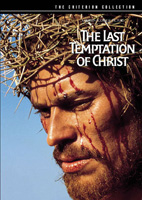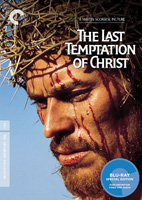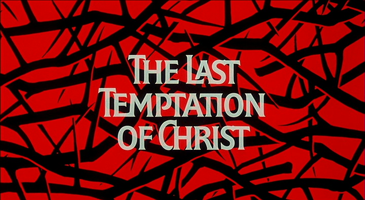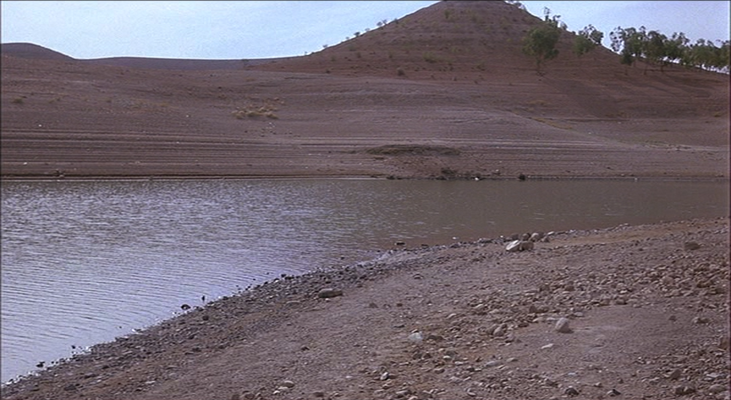2000:  2012:
2012: 

directed by Martin Scorsese
screenplay by Paul Schrader
based on the novel by Nikos Kazantzakis (ο τελευταίος πειρασμός, 1953; translated by Peter A. Bien as The Last Temptation of Christ, 1960)
Criterion #70.
Historical Jesus is a movie I’ve always wanted to see. As I imagine it, it’ll be a movie with a strong sense of place, something that puts the man’s life in familiar human terms. Something that offers me the sensation of recognition: ah, I get it, I feel it now. As things stand, my sympathy for Jesus, and for all the supporting players in his story, is still only roughly sketched, with just a few points of color. I want some skilled artist to come fill in the detail. Sometimes we know exactly what art we could use; I feel certain that I could use some non-Christian art about Christ.
So I had very high hopes for this. I realized that it was going to be more essentially poetical than Historical Jesus, the movie in my head, but I was led to understand it was still going to be about Jesus as a recognizable human being, about the story of Jesus as the story of a man’s struggle with real circumstances.
Reader, I had been misled. I realize that false expectations are a bad reason to dislike a movie… but I cannot tell a lie. I found the film bewildering in the watching, unsatisfying in retrospect, unsuccessful in the ultimate analysis.
The Last Temptation of Christ is not about a man who happens to be Jesus. It is about a man… who turns out to be JESUS!!!
The spiritual struggle it depicts is encapsulated in those exclamation points. OMG: The Movie.
It may sound like I’m making a highly nuanced (or petty) distinction, but as a non-Christian I can say that it is for me an immediate and unavoidable difference. An ordinary man’s struggle to be a prophet of love is a universally valuable subject for a movie. A man’s struggle to come to terms with being THE CHOSEN ONE, AND NOT JUST ANY CHOSEN ONE, BUT THE BIG ONE! CAN YOU EVEN IMAGINE!?!? is only to be distinguished from Harry Potter to the degree that one is already a member of the fan club.
I do not pay regular dues to this particular fan club. I can respect it from a distance. But this was not a movie for mere spectators. It thought it was, but it wasn’t. If you don’t already feel the epic weight coming from your offscreen beliefs, what’s onscreen doesn’t really make sense.
I was bewildered, rather than just bored, because it so closely mimicked the movie I wanted it to be, and I was doing my darnedest to play along. We get a gradual progression: from Jesus in fearful denial of his spiritual calling to Jesus as increasingly bold spiritual leader. Well, I had come to the movie expecting exactly that! I figure the “voice of God” is a kind of psychological experience, and in any case metaphor can overlap with the supernatural. I was ready to work with that!
But every scene or two, the movie would shake me off: Nope, he’s explicitly doing non-metaphorical miracles. Nope, he’s explicitly not arriving at these thoughts by himself, just delivering them from on high. Nope, the disciples aren’t following him because he has something to offer them, they’re following him because they can sense that he’s Jesus Christ! Or something!
The awkward relationship between the “human” and the “superhuman” storytelling constantly leaves gaps in the sense, which the viewer has no choice but to fill with “or something!” Perhaps a sufficiently Christian viewer can convince him/herself that this is The Holy “Or Something,” the sacred mystery. Once you’ve committed to sanctifying your experience of The Bible, an incredibly esoteric archaeological text, then obscurities and inscrutability become part of the package of spiritual experience. This movie’s gaps and paradoxes can just be folded into the great awe.
But what we’re dealing with here is not a thousand-year-old palimpsest; it is, like Big, a movie from 1988, and so has no reason not to be clear and feel right. It just doesn’t feel right. I spent the whole movie sagging uncomfortably in the gaps. The characters relate to each other neither familiarly nor epically; the actors are all trying to split some unsplittable difference. The camera looks around with solemnity but not conviction. The few showy gestures feel overassertive; the rest feels underassertive. What goes on is mostly loose, watery.
The movie is two-and-a-half hours of hearty whole wheat dough, uncooked and sticky. Maybe a taste, sure, but eating an entire batch of uncooked dough is inadvisable, and this is a big batch.
And I can’t help but feel that the filmmakers kind of knew that they were getting away with something they didn’t understand, hiding behind poetry instead of inhabiting it. Making cohesive statements about profound spiritual matters is perfectly possible; this movie, with all its dreams and visions and riddles, and no solid ground, seems like kind of a phony.
Then again, the spiritual is never objective; what genuinely sustains Martin Scorsese might naturally seem absurd to me. Movies capture whole frameworks of reality, and peering into another man’s spiritual framework is always a strange experience. The core of spirituality is always so obviously something biographical: an image from elsewhere in life that happens to have been infused with that stained-glass feeling. In Mel Gibson’s mind, corporal punishment is carried out endlessly. In Carl Theodor Dreyer’s mind, a weeping innocent is surrounded by glowering faces. In Martin Scorsese’s mind, gruff men with New York accents argue inscrutably. I believe it.
They really do all talk with New York accents; the whole movie is like some kind of strange stunt casting. “Harvey Keitel as Judas Iscariot” is as bizarre and unconvincing in practice as it sounds on the page. The film climaxes with a standard mob-movie scene: Jesus (having been tempted to accept the life of an ordinary man) lies in his false deathbed and receives surprise visitors from the good old days, the apostles in age makeup. “What happened to you?” asks Jesus of Peter. “I got old,” he replies with a tough-guy smirk. “You got old,” repeats Jesus wistfully.
I have no doubt that this is all deliberate, and that Scorsese was aware of creating something extremely personal. But I think he didn’t realize that having gone so deep into his own private dream, there would be no turning back and claiming to have created anything of general religious significance. He should have gone all the way and had it take place in a half-Jerusalem, half-New York; be half the story of Christ and half the story of himself, or his father. (Or at least of Robert De Niro.) Like I said about Cocteau: only when the inward-turned gaze is completely unabashed does it finally become sympathetic. It is in the evasion of ultimate private emotions that art becomes irritating. The Last Testament of Christ feels brave to a point, but then evasive beyond.
All films are holy visions; all visions are holy. Jean Cocteau’s ego-films were no less spiritual than this. More spiritual, I’d say. So too is Taxi Driver. A strenuous effort to confront “the spiritual” head-on can be misleading, can distract the artist from himself. What we are really seeking, what is really spiritual, is always off to one side.
The theological crux (so to speak!) is in the notion that Jesus has to die on the cross: what does this “has to” mean? This question is basically at the heart of Christianity, right? Well, the movie does not address this question. It holds up the “has to” as a holy and terrible fact, and makes a great prolonged drama out of its consequences — the dangerous “last temptation” is the temptation to believe that he doesn’t “have to” — but it does not actually touch it or humanize it or explore it. It just is this way. He just has to. ‘Cause that’s what Lucy says.
Lucy’s the boss, so you’ve got to listen to Lucy!
Hm. The song is rather ominous, isn’t it.
Interpretive key: Simon (= Peter, apostle), is usurped by Lucy (= Lucifer). Lucy says, “I wanna be the queen of the world, yes I do.” Lucy says, “I want everything my way.” Lucy says, “I’m gonna be a beautiful girl, yes I am.” Which is the form he takes in the movie. Also as in the movie, Lucy tricks her followers by telling them they may put down their hands, rather than keeping them up on the cross. (Just look at them all posed like martyrs!) Ultimately Lucy betrays them all, even the prophet Linus (= Jesus), who gives in to the last temptation to run in place (= lead a mortal life of no eternal consequence), giving dominion of the earth back to the wild beasts.
LUCY’S THE BOSS, LUCY’S THE BOSS!
LISTEN TO LUCY, LISTEN TO LUCY!
This movie has the same ending as Brazil. (“Uh-uh I didn’t say Lucy says!”) If anything it’s even more toxic here.
Given the task at hand, Willem Dafoe does an admirable job, and after seeing Fishing with John I feel warmly toward him. But see above for all the reservations that his performance could not, or at least did not, overcome.
The photography is mostly handsome, though I had the clear sense that the filmmakers were out of their element and did not intuitively know how to look at the Moroccan landscape. Movies shot in California always look like they know exactly what they’re seeing and what it’s like to see it. Movies shot on exotic location sometimes have a bit of an uncertain eye. In image and substance, this movie felt like tourism. Dutiful tourism.
Or: like Scorsese’s very eager and conscientious eating of his spinach. He is a good boy and will eat it all, and really taste it, and care about it! Look how good he is: he’s eating it even when nobody asked him to! Even when no one really wants him to, in fact!
Conscientiousness is not an aesthetic virtue.
I watched the movie back in December, and drafted the above immediately after. (Except for the “Lucy Says” part — that I put in just now, in a different mood! Could you tell???)
The plan, as usual, was then to watch all the other stuff on the disc and add further comments down here. But boy, I really didn’t want to watch that stuff.
I mean, within a day or two I did watch the on-set footage, which I always enjoy, and I did enjoy it — especially seeing Martin Scorsese videotaping himself in the mirror with a bulky 80s VHS camera and musing, in his excitable way, “I wonder if that red blinking light means that it’s recording.” And then I flipped through a bunch of the “extensive collection of research materials, production stills, and costume designs,” but it was really quite like spinach-eating. After reading about 20 screens worth of dry summary of the archaeological record concerning crucifixion — simultaneously grim and tedious — I had to take a break.
Then a week or so after that, I watched half of the commentary (Scorsese, Dafoe, Paul Schrader, and uncredited actual screenwriter Jay Cocks). It was fine, I guess, but a little too vindicating of my assessment above. Scorsese says outright that he thinks the movie isn’t successful and represents a mistake on his part — that he understands now that his lifelong struggle to think about religious concepts actually gets in the way of his artistic spirituality, and so this movie is all a kind of barking up the wrong tree. Really, almost in so many words. Meanwhile Schrader and Cocks and Dafoe are all talking about the care and intelligence they tried to bring to this difficult, awkward assignment. That would be interesting to hear if I thought the assignment had been basically worthwhile. But I don’t, and the director is brave enough to admit that he doesn’t either.
So this really is just the “dutiful conscientiousness” show, which is the ultimate turn-off, and after a couple hours I turned it off. I then proceeded to delay and delay and delay watching the rest of the stuff on there (assigned to me by my own principles of dutiful conscientiousness)… to the point of renewing this library DVD every Monday for weeks on end, never touching it. Just now I went to the library website to click my weekly click, but instead of doing my bidding, it gave me a pop-up warning with a big red exclamation point: “TOO MANY RENEWALS.” Apparently there is a limit of 10.
Well, having reached this limit, I take it as a sign that I have sat out my sentence, done my due penance, and am no longer under obligation to watch the rest of this DVD. I may return it to the library and proceed on to Criterion #71. Woo-hoo!
Connection to the previous movie: audienceless vanity project in which a man searches for meaning in a barren landscape.
Oh right, I always mention the music with these. This movie has a charismatic score by Peter Gabriel that proved to be extremely influential in establishing the sound of what most subsequent “world music” pop/soundtrack borrowing would sound like. I’m pretty sure you can thank and blame Peter Gabriel for all movie scores with a drone, exotic keening, and propulsive drums. This tree he planted in 1989 would grow a thousand increasingly lame branches. There’d be no Lion King without Last Temptation; neither would there be any Jason Bourne et al. These days, what doesn’t sound like this?
That link goes to the opening track from the album-ified version of the Last Temptation score, but I couldn’t make it my official ripped selection because in the movie it doesn’t have a clean start or finish. So instead I’m offering up the end credits as our Track 70. (A shorter version with a different mix is titled “It Is Accomplished” on the album.) The “world” elements aren’t very prominent on this cue — it’s a fairly straight-up Peter Gabriel pop instrumental in “In Your Eyes” mode, bookended by some wild ululation.
What does any of this have to do with the movie? It’s exactly what it sounds like: yet another collaborator’s conscientious effort to make sense of Marty’s assignment about melding present-day feeling with the ancient setting. Since Peter Gabriel was just writing music, he didn’t have to specifically put JESUS with a capital JESUS into his contribution, so he comes out looking the best of any of them. There’s an interview with him on the disc, and some kind of gallery of the ethnic instruments, which I may or may not have flipped through. I suppose that interview might well be interesting.
But it has already been determined by the 10-week rule that I am done here and am moving on.
It is accomplished!

As a kid I knew only that this movie was controversial. (Other movies I knew to be controversial without knowing anything about them, and in fact without knowing anything about them to this day: sex, lies, and videotape; The Cook, The Thief, His Wife and Her Lover.) Given that, this is exactly the reverse of what I would have imagined this movie to be about — gratuitously blasphemous, not confusedly Christian. Go figure.
Update: I have now read the Wikipedia articles about sex, lies and Cook, Thief, and they both sound charmingly bizarre. Why were you such a prude, ten-year-old-Newsweek-reading self?